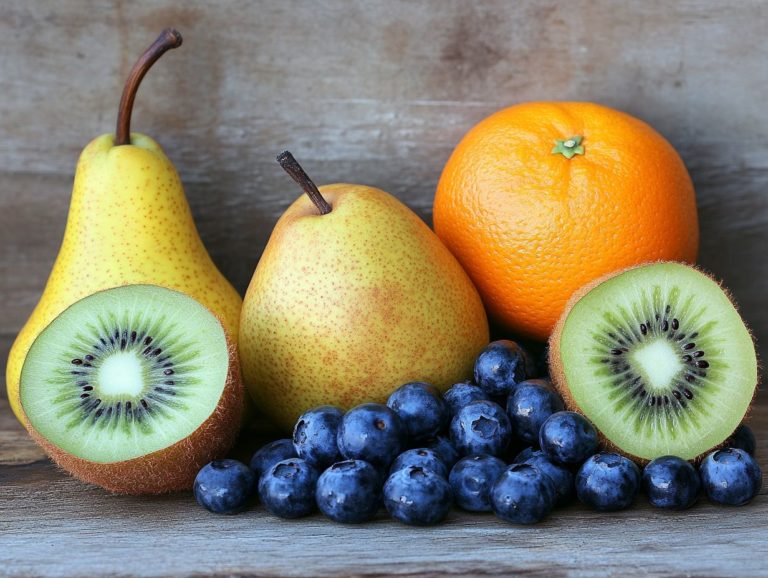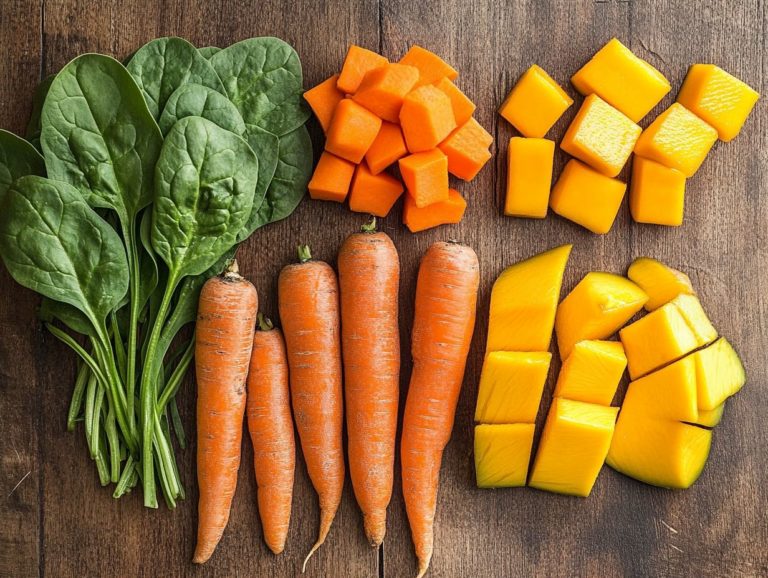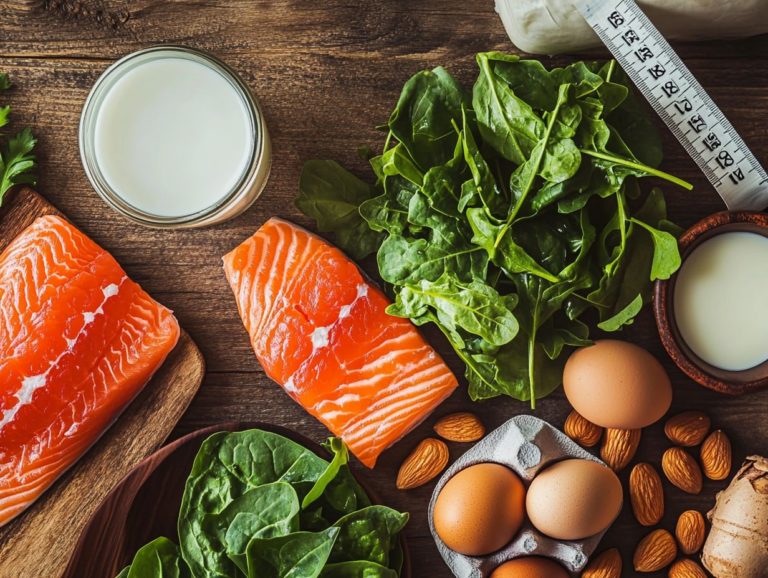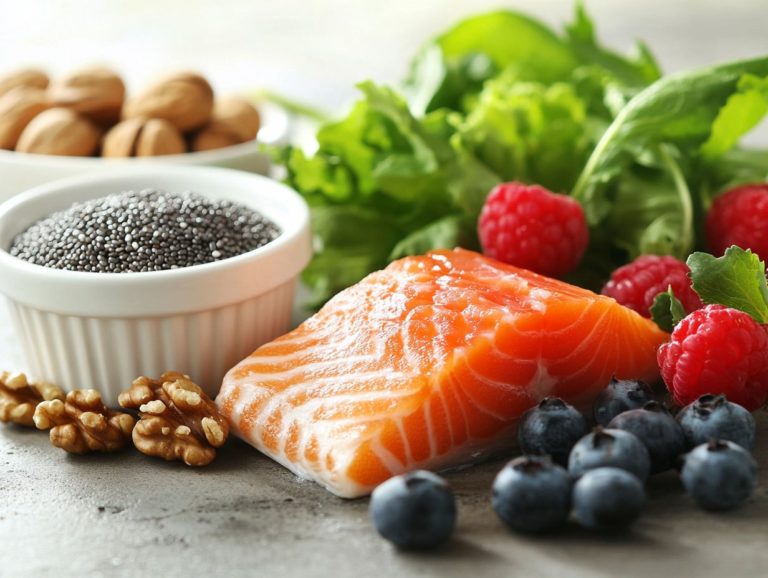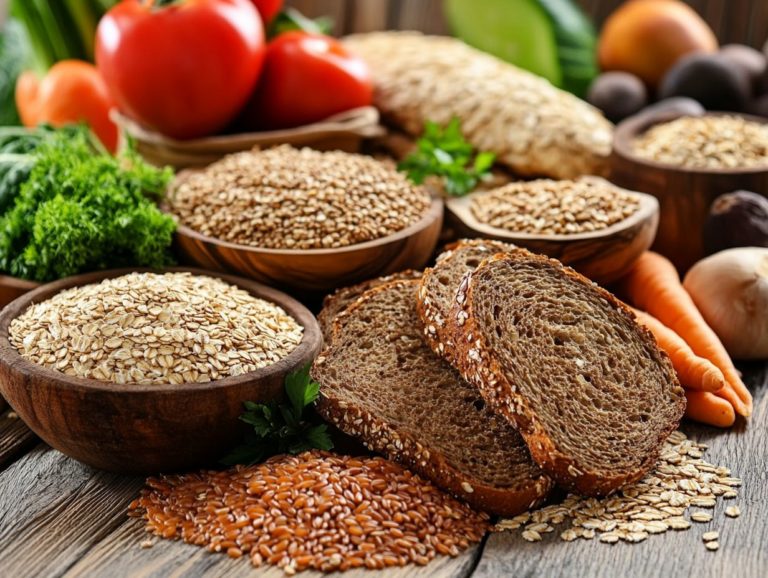5 Foods High in Probiotics for Gut Health
Unlocking the secrets of gut health begins with your understanding of probiotics those beneficial bacteria that play a vital role in your digestive well-being.
This article delves into five powerhouse foods packed with probiotics, including yogurt, kefir, kimchi, tempeh, and kombucha. You’ll discover what probiotics are, the different types available, and how they can enhance your gut health.
It also includes intake recommendations, alternative sources, and tips to add these foods to your diet, potential risks, and guidance on selecting the right supplements.
Dive in and nourish your gut!
Contents
- Key Takeaways:
- 1. Yogurt
- 2. Kefir
- 3. Kimchi
- 4. Tempeh
- 5. Kombucha
- What Are Probiotics and Why Are They Important for Gut Health?
- What Are the Different Types of Probiotics?
- How Can Probiotics Benefit Gut Health?
- What Is the Recommended Daily Intake of Probiotics?
- What Are Other Sources of Probiotics Besides Food?
- How Can One Incorporate Probiotic-Rich Foods into Their Diet?
- What Are the Potential Risks and Side Effects of Consuming Probiotics?
- Can Everyone Benefit from Probiotic Consumption?
- How Can One Choose the Right Probiotic Supplement?
- Unlock the Secrets to a Thriving Gut Microbiome!
- Frequently Asked Questions
- Which foods are high in probiotics and beneficial for gut health?
- How do probiotic-rich foods benefit my gut health?
- Which type of yogurt is the best source of probiotics?
- What is the recommended daily intake of probiotics for gut health?
- Are all probiotics created equal?
- Can I get enough probiotics through food alone or do I need to take supplements?
Key Takeaways:
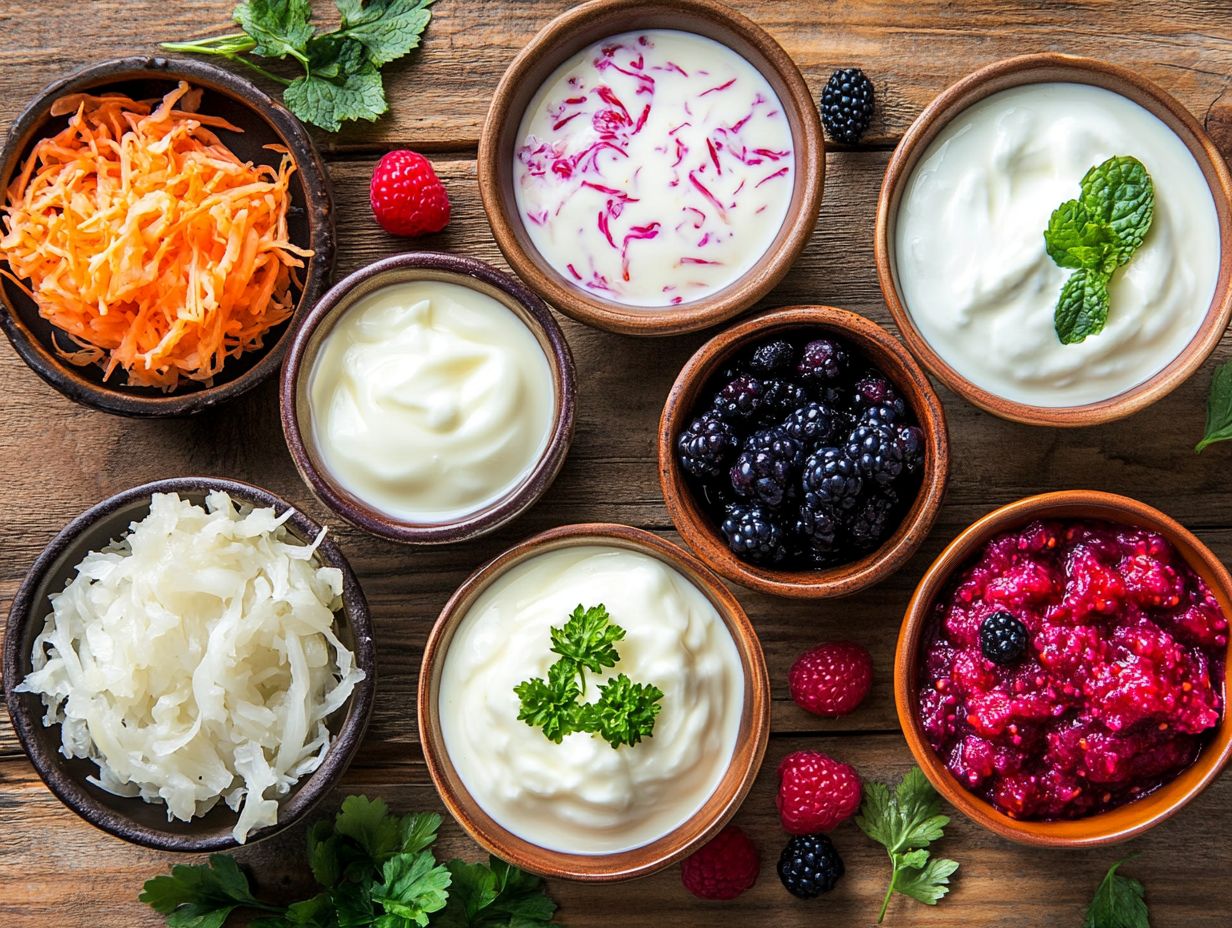
Yogurt, kefir, kimchi, tempeh, and kombucha are all great sources of probiotics for gut health.
Probiotics help maintain a healthy balance of bacteria in your gut.
Incorporating probiotic-rich foods into your diet and maintaining a healthy gut microbiome can have positive impacts on your overall health and well-being.
1. Yogurt
Yogurt is a staple in countless diets, celebrated not just for its creamy texture and delightful flavor but for its rich content of live microorganisms that play a vital role in your gut health and overall well-being. This versatile dairy product is brimming with beneficial bacteria, making it one of the most sought-after probiotic-rich foods around the globe.
Yogurt supports digestive health and boosts your immune system, making it a fantastic addition to any balanced diet.
With an array of yogurt types think Greek, Icelandic skyr, and various plant-based options you’ll encounter distinct probiotic strains such as Lactobacillus and Bifidobacterium. Each strain offers unique health benefits, from improved digestion to better metabolic functions.
Incorporating yogurt into your daily meals can be a delightful experience; it pairs beautifully with smoothies, elevates salad dressings, and even adds a touch of indulgence to desserts, showcasing its culinary versatility.
However, it s wise to keep an eye on added sugars and additives in some commercial varieties, especially if you’re lactose intolerant, as these could lead to digestive discomfort.
2. Kefir
Kefir is a tangy, fermented beverage full of good bacteria, making it an exceptional source of probiotics for anyone looking to enhance gut health and overall wellness.
This yogurt-like drink, made from either milk or water, boasts a diverse array of beneficial bacteria and yeasts that aid digestion and bolster a healthy immune system.
The magic of kefir lies in its fermentation process, where kefir grains are added to the base liquid. Fermentation is a process where bacteria break down sugars, creating a bubbly drink full of healthy properties. This initiates a symbiotic culture of bacteria and yeast, transforming it into a bubbly delight that can be savored on its own or blended into smoothies and dressings.
You ll find that the unique taste of kefir is often described as slightly sour and effervescent, offering a refreshing twist to various dishes and promoting a gut-friendly diet.
However, it s important to keep in mind that some individuals may experience mild digestive discomfort or allergic reactions, particularly those who are lactose intolerant or sensitive to dairy.
If you re new to kefir, consider introducing it gradually into your routine. This way, you can easily monitor any potential side effects and fully enjoy its benefits.
3. Kimchi
Kimchi, a key dish in Korean food, is not just a meal enhancer; it s a vibrant fermented dish primarily crafted from cabbage and seasoned vegetables. Packed with probiotics, it plays a crucial role in maintaining gut health and enhancing overall wellness.
This traditional delicacy not only elevates the flavor of your meals but also brings a wealth of health benefits, making it a favorite for those seeking to improve their digestive health.
With various types available, such as baechu (napa cabbage) and kkakdugi (cubed radish), each offers its own unique flavor and texture, catering to your diverse palate. The fermentation process nurtures the growth of beneficial bacteria, resulting in a rich probiotic content that can aid digestion and bolster your immune system.
Unlike other fermented delights like sauerkraut, which relies mainly on cabbage and salt, kimchi features a medley of ingredients, including garlic, ginger, and chili peppers, enhancing its nutritional profile.
By incorporating kimchi into your balanced diet, you can elevate your meals while simultaneously supporting your health, thanks to its array of vitamins, minerals, and antioxidants.
Start adding these probiotic-rich foods to your plate today and feel the difference in your gut health!
4. Tempeh
Tempeh, a fermented soybean marvel, is not just a powerhouse of plant-based protein; it also boasts a variety of live microorganisms that promote gut health. This makes it an exceptional addition to your healthy diet.
With its firm texture and nutty flavor, tempeh is incredibly versatile. It enhances your digestive wellness while also providing support for a robust immune system.
The fermentation process is fascinating it involves adding cooked soybeans with a specific culture of Rhizopus mold, transforming those humble beans into a dense cake brimming with beneficial probiotics. These probiotics aid digestion and improve nutrient absorption.
This process also boosts the bioavailability of essential vitamins and minerals, elevating tempeh as a superior choice among plant proteins.
You can slice it, crumble it, or cube it, seamlessly incorporating tempeh into salads, stir-fries, or sandwiches. It also shines as a fantastic meat substitute in both traditional and modern recipes.
Its rich protein content, paired with heart-healthy fats, distinguishes it from many other protein sources. This creates a well-rounded nutritional profile that you can feel good about.
5. Kombucha
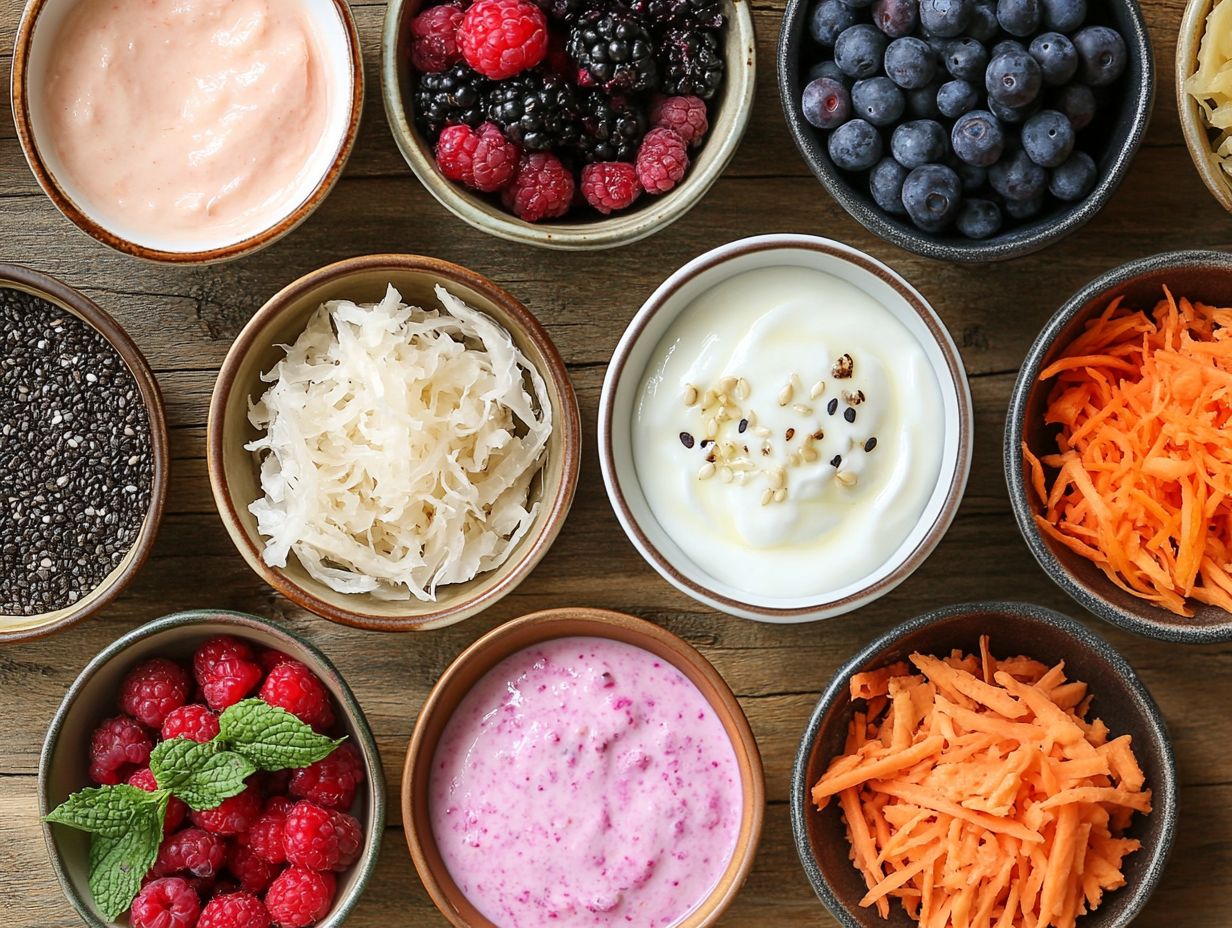
Kombucha a sparkling fermented tea is not just a drink; it s a celebration of distinctive flavor and effervescence, packed with probiotics that work wonders for your gut health and overall well-being.
This refreshing concoction arises from the fermentation of sweetened tea with a SCOBY, which stands for Symbiotic Culture of Bacteria and Yeast. It has surged in popularity among health-conscious circles. The fermentation process transforms your tea into a lively elixir, infusing it with beneficial microorganisms that may enhance digestion and bolster your immune system.
If you’re considering making kombucha at home, make sure to keep everything clean and tidy for the best results. Keep an eye on the fermentation time, which usually spans one to three weeks, depending on how tart you want it to be.
The flavor possibilities are truly endless. Don t hesitate to experiment with various fruits, herbs, or spices to create a delightful range of tastes. Just remember to enjoy kombucha in moderation, especially if you have a sensitive stomach; its acidity and sugar content can lead to unwelcome reactions if you overindulge.
What Are Probiotics and Why Are They Important for Gut Health?
Probiotics are live microorganisms, often dubbed ‘good’ bacteria, that play a vital role in maintaining your gut health. They help balance the gut microbiome and support a robust immune system.
You can find these beneficial bacteria in a variety of probiotic-rich foods, such as yogurt, kefir, and kimchi. They not only enhance digestive health but also contribute to disease prevention.
Probiotics come in several strains, including Lactobacillus and Bifidobacterium, each offering unique benefits for your body. They work to boost the population of healthy gut flora, crucial for effective digestion and nutrient absorption.
A well-maintained gut microbiota does wonders for digestion and strengthens your immune response, as around 70% of your immune system resides in the gut.
When this delicate microbial balance is disrupted often due to factors like a poor diet, stress, or antibiotics you might experience issues such as digestive disorders and weakened immunity. Therefore, understanding the importance of maintaining gut health through probiotics is essential for your overall well-being.
What Are the Different Types of Probiotics?
You ll find a wealth of probiotics, each boasting its unique strains and benefits that significantly contribute to gut health and your overall well-being. These beneficial bacteria vary in properties and effects some enhance digestive health, while others bolster your immune system.
Take Lactobacillus, for instance; it s well-regarded for breaking down lactose and easing the symptoms of lactose intolerance. Meanwhile, Bifidobacterium excels at strengthening gut barrier function and reducing inflammation. Then there s Saccharomyces, a yeast probiotic known to combat diarrhea and enhance overall digestive comfort.
The richness of these strains is crucial for optimal gut health. A diverse probiotic composition ensures that various aspects of digestion and immune responses receive robust support.
Incorporating a variety of probiotic-rich foods into your diet like yogurt, kefir, sauerkraut, and kombucha can help you achieve this diversity. Doing so fosters a more resilient gut microbiome and promotes better overall health.
How Can Probiotics Benefit Gut Health?
Probiotics offer numerous benefits for your gut health. They help with digestion, improve nutrient absorption, and strengthen your immune system.
These good bacteria can relieve common problems like bloating, constipation, and diarrhea, promoting an overall sense of well-being. By maintaining a balanced gut flora, probiotics are vital for digestive harmony.
Research shows that certain strains of these beneficial bacteria can lower the risk of gastrointestinal disorders, such as irritable bowel syndrome (IBS) and inflammatory bowel disease (IBD). They interact with your gut’s immune system, enhancing its function and helping to protect against illnesses.
A study published in The American Journal of Clinical Nutrition found that regular probiotic intake significantly reduces respiratory infections.
Experts recommend including these microorganisms in your daily routine as a simple yet effective way to optimize gut health and prevent various health issues. Don t miss out on the benefits of probiotics!
What Is the Recommended Daily Intake of Probiotics?
The recommended daily intake of probiotics varies based on individual health needs. A general guideline suggests aiming for 1 to 10 billion CFUs (units that measure the number of beneficial bacteria) for optimal gut health.
Consider factors like age, diet, and specific health goals when deciding the right amount of probiotics for yourself.
For instance, seniors may require higher doses due to changes in digestive function, while younger individuals might need less. If you’re managing certain health conditions, like IBS or taking antibiotics, you ll likely need more probiotics to restore balance.
Your dietary choices also matter. If you follow a vegetarian or vegan diet, you can look for fermented foods like kimchi and sauerkraut or choose dietary supplements with probiotic strains.
Yogurt, kefir, and kombucha are great sources that can naturally boost your daily probiotic intake. Understanding these factors helps you make informed choices about incorporating probiotics into your routine.
What Are Other Sources of Probiotics Besides Food?

In addition to traditional probiotic foods, there are many other sources, including supplements that can enhance your gut health. Probiotic supplements often come in convenient capsule or powder forms, delivering a concentrated dose of beneficial bacteria.
As you explore your options, consider different types available, especially those focusing on specific strains for digestive issues or immune support. While supplements offer convenience, they may not always match the effectiveness of fermented foods, which provide additional nutrients.
Don t forget to include prebiotic-rich foods like garlic and bananas in your diet; these support probiotic activity and create a beneficial relationship that promotes gut health.
By combining food sources and supplements, you can significantly enhance your overall wellness.
How Can One Incorporate Probiotic-Rich Foods into Their Diet?
Incorporating probiotic-rich foods into your diet can be enjoyable and straightforward. Adding options like yogurt, kefir, kimchi, and sauerkraut to your meals will boost your intake of beneficial bacteria.
Start your day with a yogurt parfait topped with fresh fruits and granola.
For lunch, try kimchi fried rice to add flavor and gut-friendly benefits.
At dinner, enjoy sauerkraut with roasted meats or in hearty soups, enhancing the depth of your dishes. Get creative by mixing kefir into smoothies or dressings for tangy dips that complement various meals.
The possibilities are endless, making your culinary adventure with probiotics both exciting and satisfying. Start incorporating probiotics into your diet today for a healthier gut!
What Are the Potential Risks and Side Effects of Consuming Probiotics?
While probiotics are generally safe for most people, it’s important to be aware of potential risks and side effects. This is especially true if you have underlying health conditions or a compromised immune system.
When you first introduce probiotics into your diet, you might experience symptoms like bloating, gas, or digestive discomfort.
If you have specific medical issues such as autoimmune disorders or severe allergies, you may react negatively to these supplements. Misunderstanding or misusing probiotics can lead to an imbalance in your gut bacteria, potentially worsening symptoms instead of providing relief.
Before starting any new dietary supplement, talk to a healthcare provider. They can offer personalized advice, ensuring that the benefits of probiotics outweigh any risks, especially if you are taking other medications or undergoing treatment for health concerns.
Can Everyone Benefit from Probiotic Consumption?
Many people can benefit from probiotics, but certain groups may experience even greater advantages due to specific health conditions or dietary needs.
If you have gastrointestinal disorders or are on antibiotics, probiotics can be particularly helpful in restoring your gut health.
If you’re on a restrictive diet whether as a vegan or due to food intolerances probiotics can assist in maintaining a balanced gut microbiome despite your nutritional limitations.
The elderly often face unique challenges related to digestion and nutrient absorption, making them prime candidates for these beneficial microorganisms.
Personalized health approaches are crucial when it comes to probiotic consumption, as individual responses can vary widely. By adjusting your probiotic intake to fit your lifestyle, health challenges, and dietary preferences, you can maximize benefits and enhance your overall well-being.
How Can One Choose the Right Probiotic Supplement?
Choosing the right probiotic supplement can feel overwhelming with so many options available. Understanding key factors will help you make an informed decision for your gut health.
Look for supplements with a diverse range of beneficial bacteria and counts tailored to your health needs. It s vital to examine the specific strains included, as each strain has a unique role like enhancing digestion or boosting immunity.
Pay attention to the number of active bacteria; remember, more isn t always better. Another important factor is the presence of third-party testing, which verifies the product s potency and safety.
To find reputable brands, prioritize those with clear labeling and positive customer reviews. These indicators generally signal quality and reliability, guiding you to make a choice that aligns with your health goals.
Unlock the Secrets to a Thriving Gut Microbiome!
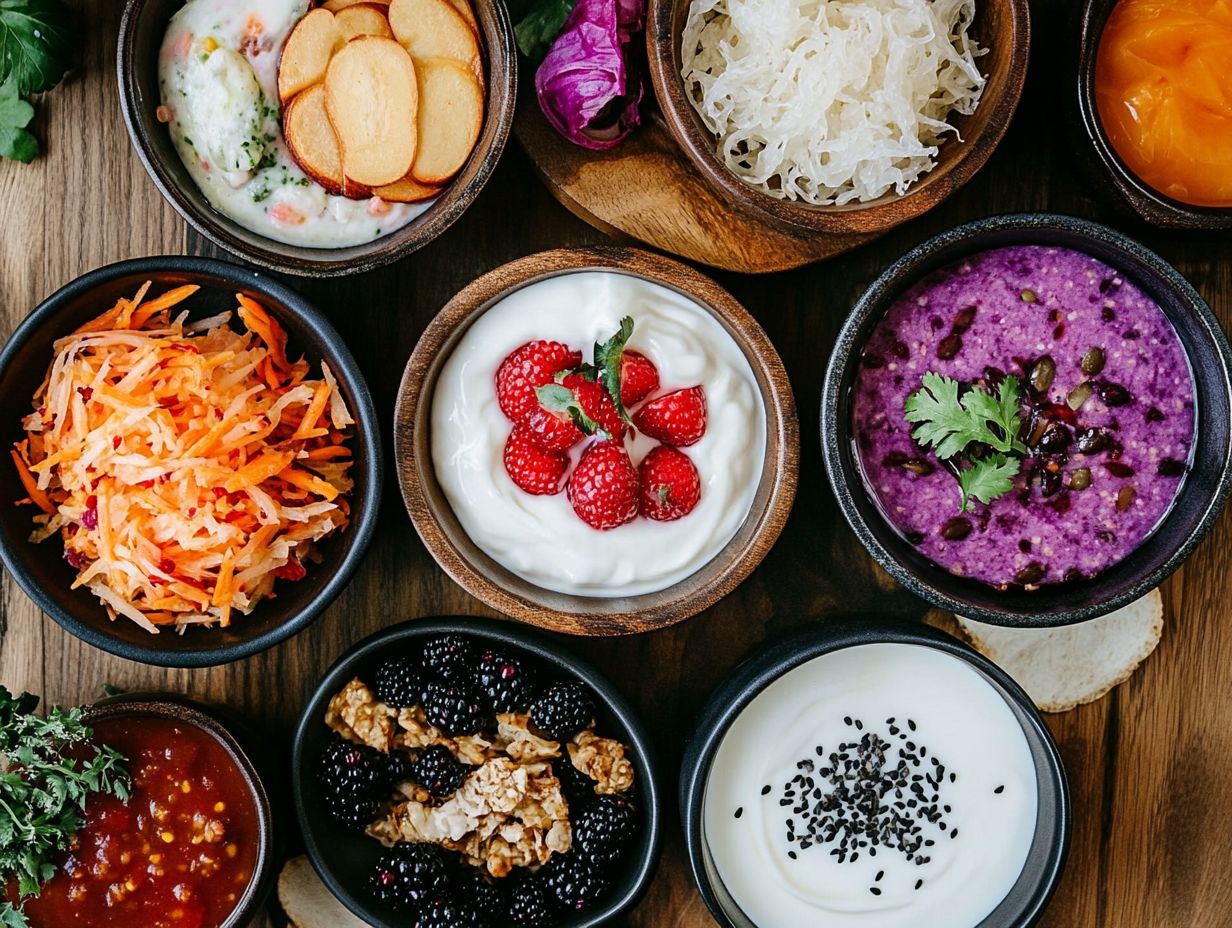
Maintaining a healthy gut microbiome requires a holistic approach that includes a balanced diet rich in both probiotic and prebiotic foods, regular physical activity, and adequate hydration. Are you ready to boost your gut health?
Recognizing the critical importance of dietary diversity is key to a thriving gut! Consuming a wide variety of fruits, vegetables, whole grains, and fermented foods ensures a well-rounded intake of essential nutrients and creates a thriving environment for beneficial bacteria.
Staying hydrated is equally important, as proper fluid intake aids digestion and nutrient transport throughout your body. Regular exercise also enhances gut function, further supporting a healthy digestive system.
By focusing on both probiotics, which introduce beneficial microbes, and prebiotics, which nourish them, you can create a flourishing gut ecosystem that significantly contributes to your overall health.
Frequently Asked Questions
Which foods are high in probiotics and beneficial for gut health?
Many foods are rich in probiotics, which are great for your gut. In addition to these, incorporating the best sources of dietary fiber for gut health is also beneficial. Top choices include yogurt, kimchi, sauerkraut, kefir, tempeh, and miso.
How do probiotic-rich foods benefit my gut health?
Probiotics are live microorganisms that help balance gut bacteria. They increase good bacteria and reduce bad bacteria, leading to better digestion and gut health.
Which type of yogurt is the best source of probiotics?
To find yogurt that is high in probiotics, choose varieties with live and active cultures. Greek yogurt, kefir, and plain yogurt are excellent options.
What is the recommended daily intake of probiotics for gut health?
You should aim for at least 1 billion CFUs (colony forming units) of probiotics each day. This can come from probiotic-rich foods or supplements.
Are all probiotics created equal?
No, probiotics vary in effectiveness. Different strains affect the body in unique ways and may target various areas of the gut.
Can I get enough probiotics through food alone or do I need to take supplements?
You can get enough probiotics from food, but it may require consistent effort. A supplement can help ensure you re getting enough beneficial bacteria for optimal gut health.

